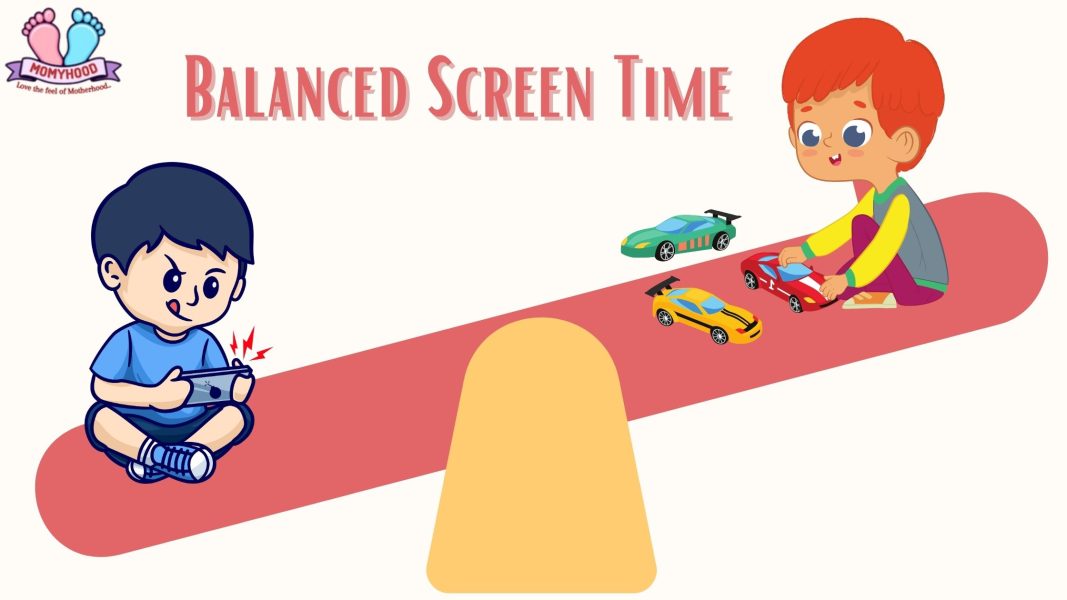As a new mother, I was initially overwhelmed by the conflicting advice and opinions regarding screen time for young children. While some experts recommended completely avoiding screens for children under the age of two, others suggested limiting it to one hour per day for older children. But I was so sure that I would stop my son from seeing the phone as long as I can & I had made a vow to limit his screen time and to encourage him to engage in more creative and imaginative play.
While this blog may not necessarily be beneficial for mothers who are currently facing difficulties with their children’s excessive exposure to screen time, it can be an invaluable resource for new mothers or those with young children, particularly those around the age of one.
Through my personal experience, I have learned that managing screen time for young children can be challenging, but it is possible to achieve a balanced and manageable routine. And I can proudly say, Hitarth’s screen time is easily manageable.
*It’s important to note that there may be exceptional days where managing screen time is not possible, such as when I have extra work to do or is not feeling well. In these cases, I am okay to rely on screens for a short period of time, as long as it’s not a regular occurrence. So, here is the journey of managing & balancing his screen time.
”You can anytime DM me on Instagram if you have queries or need more help regarding this. I would be happy to help!”
When Hitarth was around 1 year old, we made a conscious decision to delay introducing mobile devices until he turned 3 and instead focus on hands-on activities that kept him engaged and occupied. For example, we encouraged him to play with blocks, puzzles, and drawing materials. We also spent plenty of time outside, exploring nature and playing games.
Initially, in those two years, he used to watch rhymes on TV, but he was never completely engrossed in it, so switching off the TV never upset him. To limit his screen time with television, we set clear boundaries and only allowed him to watch specific programs for a limited time each day. I personally believe that limiting screen time with the use of television is still easier to control.
📣 Loved what you read? Want to go deeper into conscious parenting? ✨ The Power of Manifestation in Parenting is now available — A soulful guide packed with real-life tools like affirmations, energy shifts, and sleep talk that I personally use with my son, Hitarth. 💛 Start your journey toward calmer, connected parenting today. 🎉 Launch Offer: Only ₹99 (limited-time price!) 📲 Instant download. No waiting. 👉 Grab your copy now!.
Around 1.2 years of his age, we observed that he was interested in cooking, an excellent way to keep him engaged without relying on screens. He enjoyed helping me with simple tasks like peeling vegetables or stir ingredients and measure the flour, and we often made tea together. Involving him in kitchen-related chores was an effective way to keep him engaged without screens. These activities not only kept him busy, but they also helped him develop essential life skills like cooking and cleaning & helped him develop his fine motor skills.
Today, I can proudly say that my 3.9 years old can cook better than his 32 years old dad. Lol!
Involving young children in household chores can also help them develop a sense of responsibility and self-sufficiency. By encouraging him to help with small tasks like cleaning the table or putting away his toys, he learned that he could contribute to the family and take care of his own needs.
However, all of this changed when we had to stay in a hotel room for 15 days with limited activities. That’s when I started giving him a mobile device, even allowing him to watch videos while eating. Looking back, I now realize that this was a mistake. He became accustomed to this routine and even asked for the phone during meals after we were back at our place; our sweet home.
Initially, we used to feed him while he was on phone, but we gradually encouraged him to feed himself with a spoon or fork, so he would get busy eating and not remember the phone. We also provided him with kid-friendly utensils and plates to make the experience more enjoyable for him & this was ge best decision ever. Gradually, he understood and can now finish his meals without relying on screens.
Apart from the meal times also, he has a limited amount of screen time, typically around 10 to 15 minutes. He usually loses interest in the device on his own and starts playing with his cars instead. We have found that by setting clear boundaries and providing alternative activities, he has become more self-regulated when it comes to screen time.
There is another important tip that has been working wonders for me as a parent, although you may not find it right. So, what I do is, I don’t pick up his toys after play & don’t ask him to do that because I noticed that not picking up his toys or asking him to pack them away makes him more likely to play with them independently every now & then.
If his toys are packed away, he may not remember them and instead ask for other items, such as a mobile device, to pass the time. By leaving his toys out and accessible, he is encouraged to play independently and develop his imagination and creativity. Obviously, we pick at the end of the day.
Also, I don’t bother about the mess anymore because it has given me more time to focus on other things, and it’s also helped my child develop a sense of responsibility and independence when it comes to tidying up after himself. While it can be a bit messy at times, I’ve found that the benefits outweigh the drawbacks, and I’m happy to support my child’s growth and development in this way.
I also emphasize the significance of parental involvement in managing a child’s screen time. Expecting a child to always play independently and stay away from screens may not be realistic. However, with parental involvement, it is possible to effectively redirect the child’s attention to other activities, even if the child initially shows resistance. For example, I have observed that when I engage with Hitarth and offer alternative activities, I can successfully & easily distract him from screen time. Finding a balance between screen time and alternative activities is crucial, and parental involvement plays a vital role in achieving this balance.
Here I can say, maybe I am blessed because he enjoys books and other activities just as much as watching videos on the phone. It makes it easy for me to encourage him to do other things that are useful and he happily participates. It’s great to see him learning and growing in different ways.
Now that Hitarth is 3.9 years old, we have established a screen time routine that works well for our family. We still limit his time with mobile devices, but we also allow him to use them for educational games and activities. We also make sure to incorporate plenty of hands-on activities into our daily routine. For example, we’ve started doing activity books, cooking, etc. We’ve also been reading books and playing board games as a family.
So, based on my personal experience, I advise new mothers to avoid introducing mobile devices to their children until after age 3, if possible. It can be difficult to control screen usage once children have become accustomed to it, and they may become resistant to alternative activities. Therefore, it is important to establish healthy habits early on to promote a balanced and varied routine for young children.
In conclusion, managing screen time for young children can be challenging, but achieving a balance that works for both parents and children is possible. By gradually introducing screens and setting clear boundaries, encouraging hands-on activities, and limiting screen time, we can help our children develop healthy habits that will serve them well in the long run.
Lastly, this advice is based solely on my personal experience and opinions as a mother, which I hope can provide helpful tips and guidance for new mothers navigating this complex issue. Remember that each child is unique; what works for one family may not work for another. It is always recommended to consult with a pediatrician or child development expert for personalized advice on managing screen time and promoting healthy habits for young children.
You can anytime DM me on Instagram if you have queries or need more help regarding this. I would be happy to help!
Your comments and shares do more than just support our blog—they uplift the amazing moms who share their stories here. Please scroll down to the end of the page to leave your thoughts, and use the buttons just below this line to share. Your support makes a big difference!



